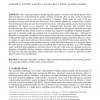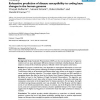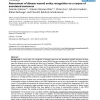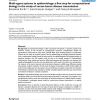GPEM
2007
14 years 1 days ago
2007
Our rapidly growing knowledge regarding genetic variation in the human genome offers great potential for understanding the genetic etiology of disease. This, in turn, could revolut...
BMCBI
2007
14 years 3 days ago
2007
Background: The majority of common diseases are multi-factorial and modified by genetically and mechanistically complex polygenic interactions and environmental factors. High-thro...
BMCBI
2006
14 years 4 days ago
2006
Background: With current technology, vast amounts of data can be cheaply and efficiently produced in association studies, and to prevent data analysis to become the bottleneck of ...
BMCBI
2006
14 years 4 days ago
2006
Background: The relationship between disease susceptibility and genetic variation is complex, and many different types of data are relevant. We describe a web resource and databas...
BMCBI
2008
14 years 6 days ago
2008
Background: Studies on the relationship between disease and genetic variations such as single nucleotide polymorphisms (SNPs) are important. Genetic variations can cause disease b...
BMCBI
2008
14 years 6 days ago
2008
Background: Single Nucleotide Polymorphisms (SNPs) are the most abundant form of genomic variation and can cause phenotypic differences between individuals, including diseases. Ba...
BMCBI
2008
14 years 6 days ago
2008
Background: In recent years, the recognition of semantic types from the biomedical scientific literature has been focused on named entities like protein and gene names (PGNs) and ...
BMCBI
2008
14 years 6 days ago
2008
Background: Many common disorders have multiple genetic components which convey increased susceptibility. SNPs have been used to identify genetic components which are associated w...
BMCBI
2007
14 years 6 days ago
2007
Background: Genome-wide association studies of common diseases for common, low penetrance causal variants are underway. A proportion of these will alter protein sequences, the mos...
BMCBI
2008
14 years 6 days ago
2008
Background: Computational biology is often associated with genetic or genomic studies only. However, thanks to the increase of computational resources, computational models are ap...





